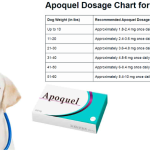Cytopoint is a popular medication for treating certain conditions in pets. However, proper dosage is crucial to ensure effective treatment results. Follow the recommended dosing guidelines to avoid under or over-medicating their furry companions.
Key Takeaways:
- Understanding the Cytopoint dosing chart is crucial for effective treatment results.
- Pet owners must follow the recommended dosing guidelines provided by veterinarians.
- Factors like weight, age, and health can affect the proper dosing of Cytopoint.
- Pet owners must adequately administer and monitor their pets after receiving Cytopoint treatment.
Want to learn Cytopoint Dosage Chart for Pet Health? Follow this link.
Understanding Cytopoint and Its Uses
Cytopoint is a medication used to treat specific skin allergies and dog itching. It is a monoclonal antibody that targets a specific protein in the body that is responsible for causing itching and inflammation. By binding to this protein, Cytopoint can effectively control the symptoms of allergies and provide relief to pets.
It is essential to follow a treatment plan when using Cytopoint to ensure optimal results. In general, Cytopoint injections are given once in 4-8 weeks, but the situation might not be the same for all and hence, your vet will determine the appropriate injecting frequency and schedule that is customized for your pet.
Understanding Cytopoint Treatment Plan
Before starting any treatment for your pet friend, your vet will consider concerns like your pet’s weight, problem, breed, health condition, and ongoing medicine. The veterinarian will decide on the best course of action for your dog’s care after taking these factors into account. When a Cytopoint treatment plan is selected, you will also be notified of the possible advantages and risks associated with Cytopoint.
We have to be familiar with the fact that Cytopoint only soothes the symptoms of allergic issues but is not the cure for allergies. Along with the treatment, you should keep your dog away from allergens and not miss the routine check-ups with the vet.
Cytopoint Dosing Guidelines
When it comes to administering the appropriate dosage of Cytopoint for pets, there are specific guidelines that must be followed. It is essential to consult with a trusted veterinarian to determine the most effective dosing regimen for each case.
The recommended dosing regimen for Cytopoint is as follows:
| Pet Weight Range | Dosage | Injection Frequency |
| Under 10 lbs. | 2 mg/kg | Every 4 to 8 weeks |
| 10-20 lbs. | 2 mg/kg | Every 4 to 8 weeks |
| 20-30 lbs. | 2 mg/kg | Every 4 to 8 weeks |
| 30-40 lbs. | 2 mg/kg | Every 4 to 8 weeks |
| 40-50 lbs. | 2 mg/kg | Every 4 to 8 weeks |
| 50-60 lbs. | 2 mg/kg | Every 4 to 8 weeks |
| 60-70 lbs. | 2 mg/kg | Every 4 to 8 weeks |
| Over 70 lbs. | 2 mg/kg | Every 4 to 8 weeks |
It becomes crucial to follow the frequency of injections suggested by your trusted vet. While some pets may require injections every four weeks, others may only need injections every eight weeks.
To ensure optimal treatment results, it is crucial to adhere to the recommended dosing guidelines and injection frequency. Pet owners should consult a veterinarian before they adjust the dosage or injection frequency.
Factors Affecting Cytopoint Dosage
Proper dosing of Cytopoint is essential to achieve optimal results. The dosage can differ for every individual pet based on the factors related to your pet such as their weight, severity of disease, underlying medical issues, and overall health condition.
Experts recommend following a dosage protocol to ensure accurate and safe delivery of Cytopoint. The dosage protocol outlines the recommended dosage for different sizes and conditions of pets and is provided by veterinarians.
Cytopoint Dosing Chart for Dogs
For pet owners seeking to administer Cytopoint to dogs, it is crucial to follow the recommended dosing chart based on the dog’s weight range.
| Dog Weight Range | Cytopoint Dose |
| 2 to 4 lbs. | 10 mg |
| 4 to 8 lbs. | 20 mg |
| 8 to 16 lbs. | 40 mg |
| 16 to 32 lbs. | 80 mg |
| 32 to 64 lbs. | 160 mg |
| 64 to 121 lbs. | 300 mg |
We should be cautious not to exceed 300mg even for those bigger dogs. The medicine should have a proper prescription from a licensed veterinarian.
Cytopoint Dosing Chart for Cats
Administering the proper dosage of Cytopoint to cats is crucial for effective treatment results. The dosing chart below demonstrates the weight-based dosage ranges for your cat:
| Cat Weight | Cytopoint Dosage |
| 2-4 lbs | 4 mg |
| 4-8 lbs | 8 mg |
| 8-12 lbs | 12 mg |
| 12-16 lbs | 16 mg |
Doses can vary amongst cats due to a variety of reasons, as is common knowledge. You must thus speak with your physician to find the ideal balance for your feline friend before deciding on the dosage. Cytopoint should not be used for cats younger than 12 months old, as per the expertise.
Cytopoint Administration and Monitoring
Proper administration of Cytopoint is crucial to ensure effective treatment outcomes. Veterinarians typically administer Cytopoint through a subcutaneous injection, which is placed under the skin. The injection is usually given in the neck or lower back region of the pet.
It is essential to follow the recommended injection schedule for Cytopoint treatment. Typically, injections are given monthly, but the frequency of injections may vary depending on the pet’s condition and response to treatment.
During the administration of Cytopoint, pet owners should ensure that the medication is administrated with proper care and safely. This includes checking that the correct dosage is being used and that the injection is placed in the proper location in the pet’s body. Pet owners should also monitor their pets closely after receiving a Cytopoint injection. Cytopoint Administration Tips:
- Ensure accurate and safe delivery of medication.
- Follow the recommended injection schedule.
- Monitor pets closely after injection.
By following the administration and monitoring guidelines, pet owners can ensure that their beloved companions are receiving the appropriate dosage of Cytopoint for their specific needs.
Cytopoint Dosage Adjustments
While the recommended Cytopoint dosages are based on factors such as the pet’s weight and condition, there may be instances where dosage adjustments are necessary. Some of the pets respond to the initial dosages and changes can be seen instantly while others might not respond well and get adverse reactions. If the treatment tends to seem backfiring then you should visit the vet as soon as possible.
Additionally, it is crucial to follow the proper dosage guidelines the veterinarian provides. Overdosing or underdosing can harm the pet’s health and result in ineffective treatment.
Cytopoint Dose Calculator
Administering the correct dosage of Cytopoint is crucial for effective treatment of your pet’s condition. To ensure you’re giving your furry friend the proper dosage based on their weight and condition, you can use the Cytopoint dose calculator.
The dose calculator is an online tool that assists pet owners in accurately determining the dosage based on their pet’s weight. To use the calculator, input your pet’s weight, and the recommended dosage will be displayed. It’s important to note that the calculator should be used as a guide, and consulting with a veterinarian is recommended before administering any medication.
Using the Cytopoint dose calculator can be particularly helpful for pet owners who have difficulty calculating the dosage based solely on the dosing chart. Additionally, for pets with unique circumstances that require a customized dosage, the calculator can assist in determining the appropriate dosage.
How to use the Cytopoint dose calculator
- Using the Cytopoint dose calculator is straightforward. Follow these steps:
- Visit the Cytopoint dose calculator website.
- Enter your pet’s weight in pounds.
- Click “calculate.”
- The recommended dosage will be displayed.
Storing and Disposing of Cytopoint
Proper storage and disposal of Cytopoint is essential for the safety of your pet and the environment. Follow these guidelines to ensure the safe administration and disposal of the medication.
Storing Cytopoint:
You should always store Cytopoint in a safe and secure location, out of reach of children and pets. Keep the medication at room temperature between 20°C to 25°C (68°F to 77°F) and protect it from light. Do not freeze or refrigerate the medication.
After reconstitution, use the medication immediately. Do not store the reconstituted solution for later use. Discard any unused portion of the medication.
Disposing of Cytopoint
Proper disposal of Cytopoint is crucial to protect the environment and prevent accidental exposure to children and pets. Follow these guidelines for safe disposal:
- Do not dispose of Cytopoint in household trash or down the drain.
- Contact your local waste management facility or pharmacist for proper disposal instructions for unused or expired medication.
- Return any unused medication or empty vials to your veterinarian for proper disposal.
By following these guidelines, you can ensure the safe administration and disposal of Cytopoint, protecting your pet’s health and the environment.
Conclusion
- Follow the Dosing Chart: Adherence to the “Cytopoint dosing chart” is essential for effective treatment, ensuring pets receive the correct dosage for their specific needs.
- Consult with Your Veterinarian: Regular consultations with a vet are crucial for any adjustments in the dosage or treatment plan, tailored to your pet’s response to “Cytopoint.”
- Adhere to Treatment Plans: Stick closely to the recommended injection schedule to maintain consistent relief from allergy symptoms for your pet.
- Proper Storage and Disposal: Ensure “Cytopoint” is stored according to guidelines and dispose of it properly to safeguard both pet health and the environment.
- Seek Professional Advice: Always turn to a veterinarian for guidance on using “Cytopoint” effectively, especially when considering dosage adjustments or dealing with side effects.
- Ensure Optimal Care: By following these guidelines, pet owners can play a significant role in providing the best care and treatment for their pets with allergies.










